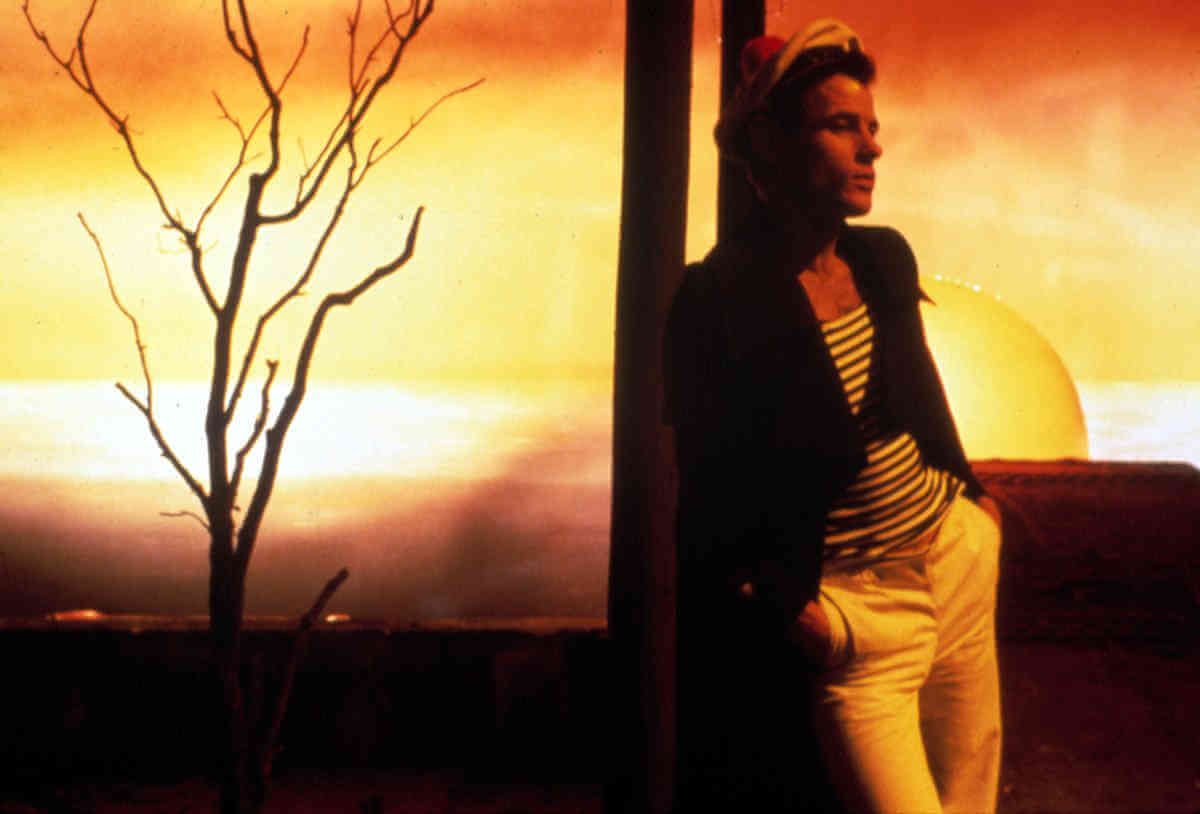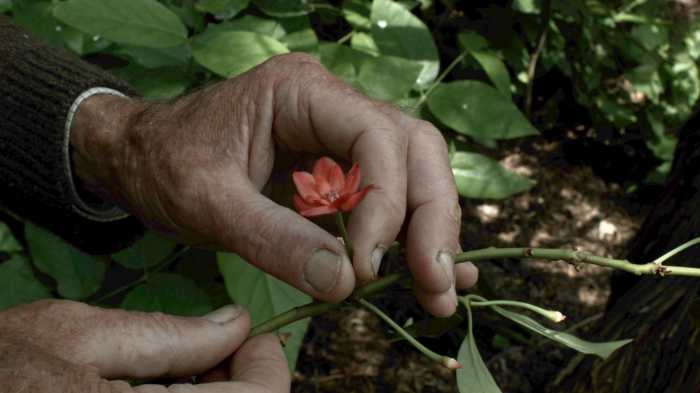As part of the Quad Cinema’s WorldPride Month programming, filmmaker Wieland Speck has curated “Queer Kino,” a program — with support from the Goethe-Institut — of nine classic queer German films from the 1970s and 1980s. Here is a rundown of some key films to seek out during this week-long engagement.
Speck’s noteworthy 1985 feature directorial debut, “Westler” (June 24 at 6:45 p.m.), is a bittersweet romance between the handsome West Berliner Felix (Sigurd Rachman) and the adorable East Berliner Thomas (Rainer Strecker). The guys meet when Felix takes his American friend, Bruce (Andy Lucas), through the checkpoint to East Berlin. (Speck shot the footage in East Berlin illegally with a Super-8 camera). Soon, Felix returns to visit Thomas, and they seal their relationship with a kiss.
The connection and longing the guys feel are heartwarming, and their sexuality does not seem an issue for either of them. However, the Wall — a symbol of communism, authoritarian politics, and the difficulties of being openly gay — is. As Felix continues to visit Thomas, he is placed under greater scrutiny at the checkpoints, being strip-searched in one humiliating scene. One evening, Felix must end a night of passion early because of the curfew.

How these lovers grapple with being so close, physically and emotionally, and yet separated by an imposed boundary forms the dramatic tension in the film. Eventually, Thomas hopes to escape East Germany.
“Westler” may feel dated, but it provides a valuable glimpse into the queer bars and drag shows the characters attend that provide them with a sense of community. And there is a surreal flashback to Thomas’s military service — a fascinating and highly homoerotic sequence. Speck’s film is a touching love story that documents an important era in German history.
One of the highlights of “Queer Kino” is the opportunity to see the late writer/ director Frank Ripploh’s outstanding 1980 feature “Taxi zum Klo” (June 21 at 10:30 p.m.; June 27 at 4:40 p.m.). The film depicts the life of Frank (Ripploh), a self-described “normal, jaded, neurotic, polymorphously perverse” 30-year-old gay teacher. It features many explicit scenes, including a glory hole sequence and a tryst involving water sports, as well as Frank enjoying an S&M spanking, performing and receiving fellatio, and even getting a rectal exam. The raunchy scenes are all presented candidly, but they are actually quite tender and sweet. Ripploh’s purpose is to depict his gay life explicit and realistically in order to normalize it.

The film is episodic as it chronicles Frank’s various sexual encounters until he meets Bernd (Bernd Broaderup), who provides the possibility of a stable relationship. However, Bernd is a homebody who wants to live in the country, while Frank is perpetually horny and restless, seeing the city as his sexual playground.
Ripploh’s performance is extraordinary. For him, the personal is political, and he is refreshingly unabashed about it — especially when he dons drag and enters his classroom in a powerful, anarchic scene. The filmmaker does not shy away from presenting copious nudity and sex and the many erotic moments reinforce Frank’s comfort in his own skin and as a gay man. “Taxi zum Klo” is naughty and shameless. It demands to be seen.
Another excellent film about a gay teacher is “Coming Out” (June 24 at 8:40 p.m.), director Heiner Carow’s sensitive 1989 story, set in East Berlin, which opens with Philipp (Matthias Freihof) meeting and dating Tanja (Dagmar Manzel). When Tanja introduces him to her old friend Jakob (Axel Wandtke), Philipp is practically hypnotized; Jakob and Philipp were once classmates who shared a special bond. Suddenly, Philipp recognizes his undeniable same-sex longings and heads to a gay bar.

Philipp’s struggle with his sexuality is palpable. Freihof conveys his character’s fear, shame, loneliness, and despair well. And when he connects with Matthias (Dirk Kummer) a young man one night, “Coming Out” becomes incredibly poignant. When Philipp says, “I’ve never slept with a man before,” his emotions are heartrending and liberating at the same time. Freihof’s expressions in this scene show how much relief, joy, and pain Philipp feels. It is as great a moment as his speech to his mother asking if he has to justify his sexuality.
The film also features considerable dramatic tension as a love triangle develops among Philipp, Tanja, and Matthias. “Coming Out” shows just how tricky it is for Philipp to navigate the emotions he is grappling with. This film is as courageous as its protagonist.
No queer German film series could exist without a contribution from the King of Queer German Cinema, Rainer Werner Fassbinder. “Queer Kino” offer two of his films, “Fox and His Friends,” (June 22 at 4:40 p.m.), from 1975, in which the director plays Franz (aka Fox), a working-class man who wins the lottery and soon falls in love with the more cultured Eugen (Peter Chatel). With his windfall, Franz helps Eugen’s father Wolf’s (Adrian Hoven) company get out of debt, buys an apartment, fancy clothes, and furnishings for him and Eugen to share, and splurges for a Moroccan vacation. But despite being warned by his friends about being exploited, Franz insists he is happy — until he admits he is not.

Fassbinder’s morality tale is a stinging social commentary on classism and racism, brilliantly realized. The bold visuals capture the sense of claustrophobia that stifles Franz’s freedom and self-expression. There are several awkward dinner scenes with Eugen’s parents that emphasize how uncouth Franz is. The love and sex are downplayed, perhaps indicating how little of each exists between the men. “Fox and His Friends” is brilliantly acted by Fassbinder, who makes his character’s pathos quite moving.
The series also includes Fassbinder’s last film, 1982’s “Querelle” (June 22 at 9: 15 p.m.). This hothouse drama, based on a Jean Genet novel, drips with eroticism from its first shot of the sweaty, shirtless title character (Brad Davis). Fassbinder’s camera fetishizes Davis, clad in his tight, white sailor’s uniform, in a way that makes him irresistible. When Querelle enters a bar cum brothel, he cheats at a game of dice, inducing Nono (Günther Kaufmann) to sodomize him. As Querelle becomes sexually intimate with several other men, he continuously denies his homosexuality (as do most of the film’s other male characters).
Fassbinder’s film addresses issues of masculinity and sexuality in intriguing ways here. An act of violence — Querelle murders a sailor — is steeped in erotic gestures. A scene where Querelle, covered in coal dust, talks with the Lieutenant Seblon (Franco Nero), who desires him, is achingly seductive. And there are phallic and other erotic images throughout the film, including the designs on the brothel’s windows. But for all the atmosphere, the emotions seem lacking.

“Querelle” is not Fassbinder’s best film, but it is certainly one of his queerest, and it yields tremendous visual delights.
QUEER KINO | Jun. 21-27 | Quad Cinema, 34 W. 13th St.; quadcinema.com



































